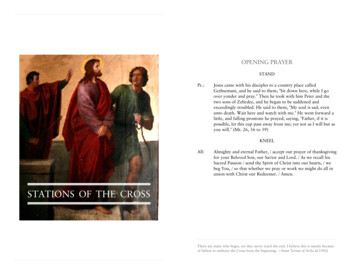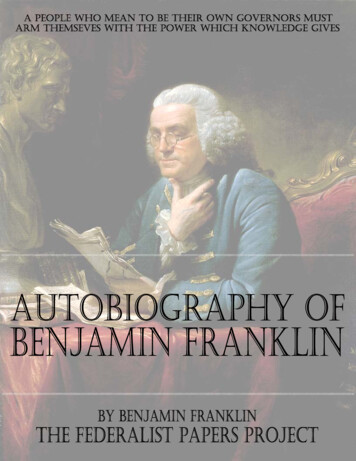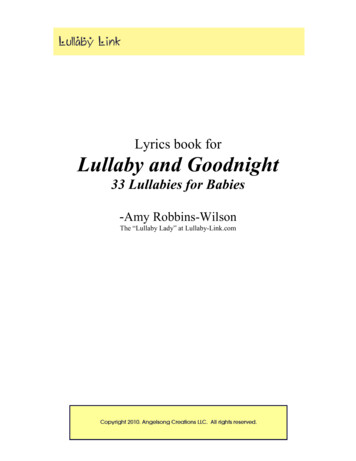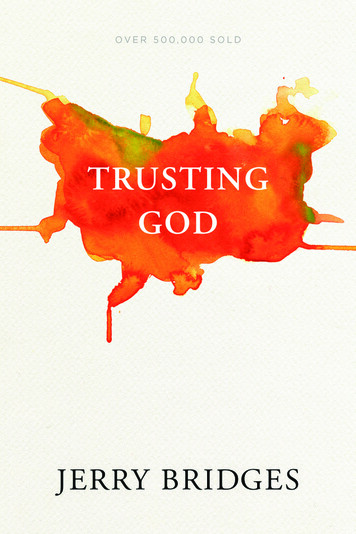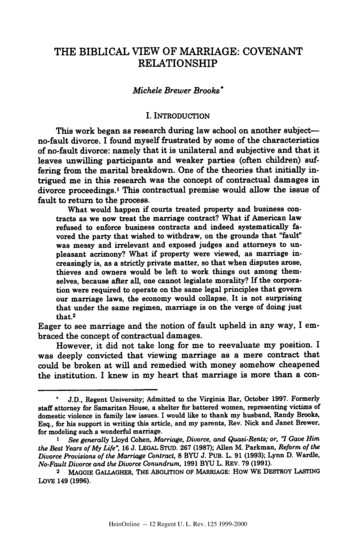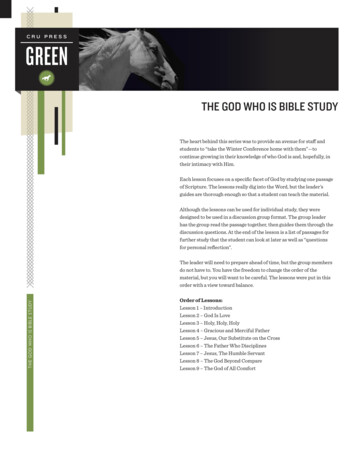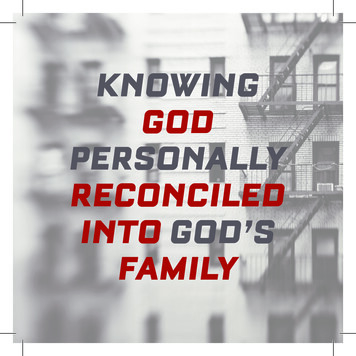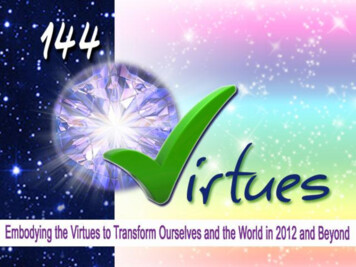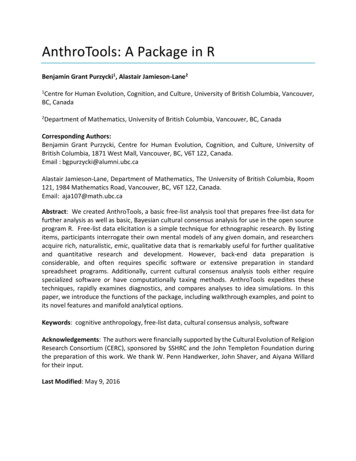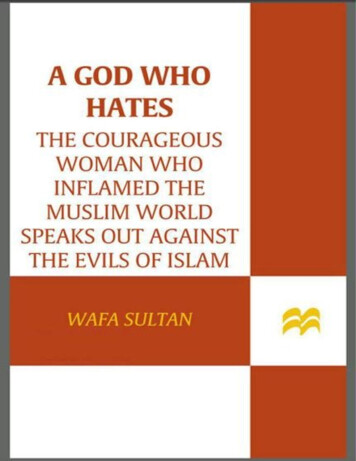
Transcription
Praise for A God Who Hates“ Wafa Sultan paints a scorching, unforgettable portrait of Syrian Muslim society,especially the degradation of its women, and lyrically appreciates her adoptedAmerican homeland, which she calls ‘the land of dreams.’ But she also worries thatMiddle East customs are encroaching on the West and writes with passion to awakenAmericans to a menace they barely recognize, much less fear.”—Daniel Pipes, director, Middle East Forum“ Like thousands of others, I first encountered Wafa Sultan on a stunning YouTubevideo. Here was a woman on Al-Jazeera TV, eloquently and courageously defendingWestern civilization, individualism, and reason against the barbarity and mysticismof radical Islam. Her performance was mesmerizing. She was articulate, selfconfident, and outspoken. She stunned the audience, the interviewer, and thepathetically outmatched Imam who opposed her. Now Wafa Sultan has written herlife story in this powerful book. She exposes the ugliness that is Muslim society inthe Middle East, while unapologetically defending the Western values she adoptedwhen rejecting the religion of Islam. If you want to understand this courageouswoman, who continues to fight for her beliefs in spite of death threats, and tounderstand her views on the conflict between Islam and the West, this is a mustread.”—Yaron Brook, Ph.D., president and executive director,Ayn Rand Institute
A GOD WHO HATES
A God Who HatesWAFA SULTANThe Courageous WomanWho Inflamed the Muslim WorldSpeaks Out Against the Evils of IslamST. MARTIN’S PRESSNEW YORK
AUTHOR’S NOTEThis is a true story, though some names have been changed.A GOD WHO HATES. Copyright 2009 by Wafa Sultan. All rights reserved. Printed in the United States ofAmerica. For information, address St. Martin’s Press, 175 Fifth Avenue, New York, N.Y. 10010.www .stmartins .comBook design by Jonathan BennettLibrary of Congress Cataloging-in-Publication DataSultan, Wafa.A god who hates : the courageous woman who inflamed the Muslim world speaks out against the evils ofIslam / Wafa Sultan.—1st ed.p. cm.ISBN 978-0-312-53835-41. Women in Islam. 2. Islam—Relations. 3. East and West. I. Title.BP173.4.S848 2009297.082—dc222009016930First Edition: October 200910987654321
To my dear husband and childrenwhose selfless love has sheltered mewhen no other place seemed safe.Lastly, to the memory of my belovedniece Mayyada, who cut her life short
by committing suicide to escape thehellish marriage imposed upon herunder Islamic Sharia Law: May hertragic account be an eternal inspirationto all who are privileged to live in freesocieties. May her story encourage allthose who have been subjugated totyranny—especially women—to becomewell informed and to persevere beyondfear and intimidation. And a challenge:To those whose spirits uphold theprinciples of justice and freedom ofspeech—May Mayyada’s story, and thatof many more whose stories have neverbeen told, embolden you to speak upagainst the unjust and immoral treatment of women in the Muslim world.
CONTENTSAcknowledgments1. A God Who Hates2. The Women of Islam3. Finding Hope for the Men of Islam4. A Quest for Another God5. The Nature of God in Islam6. Muslim Men and Their Women7. First Step to Freedom8. “Who is that woman on Al Jazeera?”9. Islam Is a Sealed Flask10. Islam Is a Closed Market11. Every Muslim Must Be Carefully Taught12. Clash of Civilizations13. Living in the “New” America: Thinking About Colin Powell and PresidentBarack Hussein Obama
ACKNOWLEDGMENTSThere is a saying in Arabic: “A single flower cannot create a blooming field.”Likewise, without my many dedicated and supportive friends I would not have beenable to bring this book to fruition. From the bottom of my heart, I would like tothank all and each one of them. I trust they know who they are; so, for me to mentiontheir names is unnecessary. I do not wish to place their lives in danger in the sameway my life is threatened.Al Jazeera media network hosted me for three programs on their famous series,“Al Itjah al Mouakes” (The Opposite Direction). After the third interview, thestation apologized to the Arab world for allowing me to “insult Islam” and as aconsequence cancelled all rebroadcasts of the program. Nevertheless, my threeinterviews on Al Jazeera introduced me and my message to millions of people, andfor that opportunity, I am wholeheartedly grateful to Al Jazeera.Middle East Media Research Institute (MEMRI) played a major role in spreadingmy mission as well. For that I would like to extend my appreciation to them.MEMRI team labors diligently to break the language barriers in order to accuratelyrepresent information emanating from the region and in doing so, offer an unbiasedjournalistic forum so the rest of the world may better appreciate the true nature ofthe perilous situation in the Middle East.Finally, I would like to thank my dear readers in the Arab world whose responses,positive and negative, have encouraged me to persevere and overcome the gravechallenges that must be faced in confronting hatred and religious intolerance.
1.
A God Who HatesMOST MUSLIMS, IF notall of them, will condemn me to death when they read this book.They may not even read it. The title alone may push them to condemn me. That’show things are with them. They don’t read, or, if they do, they don’t take in whatthey read. They are much more interested in disagreement than in rapprochementand they are—first and foremost—supremely interested in inducing fear in otherswith whom they disagree. They may even threaten to condemn you just for readingthis book because, in their cruelty, they have learned something about how to controlothers: Nothing tortures the human spirit more effectively than making someone aprisoner of her own fears. I am, though, no longer afraid. Why? Let me tell you afable that might explain how I confronted my fears of speaking out against theradical mullahs of Islam.There once was a strong and inquisitive young man who loved to travel. In histhirst for knowledge, he moved from place to place and traveled from town to town,drinking in wisdom and recording everything that happened to him.Eventually, he came to a beautiful village slumbering at the foot of a mountainsurrounded on all sides by green hills where gentle winds blew intermittently,delighting the mind and refreshing the heart. In this beautiful place, he was shockedto see that the inhabitants of this village were sad. They moved sluggishly, draggingtheir feet. To him they appeared no more than moving phantoms, without body orsoul. The sight of these phantoms terrified him. He became determined to discoverwhat made them so and set off to see a fabled wise man who lived alone, in a hut, cutoff from the village and its inhabitants.When he met the wise man, he asked what secret lay behind this great paradox.He asked why these people lived in a state of subjugation and dejection in a villagewhere everything would seem to suggest that the people would be blessed withhappiness and well-being. The sage came out of his hut and pointed toward the topof the mountain. “Look at that peak. An enormous ogre sits up there. From where hesits, he raves and shrieks, filling people’s hearts with fear by threatening to gobblethem up if they leave their homes or do any kind of work at all. The people,terrorized by his shrieks, can live only by stealth. Only their survival instinct keepsthem going. They steal out like mice in secret to gather enough to keep body andsoul together. They live day by day, waiting impatiently for the moment of theirdeath. Their fear of this ogre has sapped their intellect and depleted their physicalpowers, reducing them to despair and hopelessness.”
The young man thought for a while and said, “I’m going to the top of themountain. I will talk to this ogre and ask what makes him threaten and frighten thesepeople. I will ask him why he wants to prevent them from leading their lives inpeace and safety.”“Go up to the top of the mountain? No sane person would risk his life by daringto meet the ogre. I implore you not to do it for the sake of your life, young man!”But the young man would not be dissuaded. He was determined to do what hebelieved had to be done. And so, with slow but sure steps, he started on his way tothe peak.When the young man reached the peak, the ogre did, indeed, seem large at first;however, what he found as he walked on astonished him. The closer he got, thesmaller the ogre became. By the time he arrived he found that this great ogre whoterrorized many was smaller than his littlest finger. The young man flattened hishand, held out his palm, and the tiny ogre jumped onto it.“Who are you?” the young man asked.“I am Fear,” the ogre replied.“Fear of what?” the young man asked.“That depends on who you are. How each person sees me depends on how heimagines me. Some people fear illness, and they see me as disease. Others fearpoverty, so they see me as poverty. Others fear authority, so they see authority inme. Some fear injustice, others fear wild beasts or storms, so that’s how I appear tothem. He who fears water sees me as a torrent, he who fears war perceives in me anarmy, ammunition, and suchlike.”“But why do they see you as bigger than you really are?”“To each person I appear as big as his fear. And as long as they refuse toapproach and confront me they will never know my true size.”I sometimes feel like that young man, a person who rebels against the wisdom of hertime. I once lived in a village much like the one he discovered, for three decades.My love for it became an addiction from which I possessed neither the ability northe desire to escape. The ogre, for a time, held me in his thrall, but no longer. Beingenslaved to my own fears of the demon was a terrible time in my life, but I don’tregret the experience. For me, all things happen for a reason and that experienceonly made me stronger. I was not born in that village in vain and I certainly did notleave it in vain. I left with a purpose not unlike that of the young man. I feel, onmost days, that I must climb the mountain again and again with slow but sure stepsand confront that ogre who, for me, is the horror of radical Islam. I do it to show thepeople of that village how small and cowardly he really is.
I have never in my life seen Muslims talk without disagreement. Perhaps I amalone in this, but I don’t think so. If one says “Good morning,” the other will reply,“But it’s nighttime now.” Their tendency to argumentativeness makes themdefensive and their custom deems attack to be the best method of defense since itgives them the chance to shout and shriek. Shouting has become their hallmark andthe main characteristic they use when they engage in conversation with someonewhom they don’t agree with. Without it they have no sense of their own worth orexistence; without it they have no sense even of being alive.They concoct reasons for disagreement and welcome it much more often thantrying to bring different points of view closer together. Why? Disagreement andconfusion keeps the ogre big and threatening, obscuring his true, puny nature. On topof shouting their way through a conversation, they have acquired the habit ofshrieking, and they take pleasure in hearing their own shrieks. They believe that thelouder they shriek, the more they prove they are right. Their conversation consists ofshouting, their talk is a screech, and he who shouts loudest and screeches longest is,they believe, the strongest. They fabricate disagreements so as to give themselves anopportunity to shout. They seek contradiction so that they can scream.I have often wondered how this shrieking and shouting began and have had tothink back to the roots of Islam to understand it. If you were lost in the desert,unable to distinguish between north or south, your life threatened by hunger, thirst,and heat, and surrounded by sand dunes on all sides with no sign in sight of a humanbeing who could rescue you—at that moment, a scream is all you have to convinceyourself that you are still alive. You scream in the hope that a passerby will hear.Many Arab history books tell us stories of the terror and desolation peoplesuffered in the desert. The one I think best depicts this situation is the story of theBedouin whose only son fell ill and lay on his sickbed dying of fever. His father,overwhelmed with paternal pangs of helplessness, went out into the night in searchof a doctor. He lost his way in the depths of the desert and wandered along notknowing where his feet were leading him until, after an immeasurable length oftime, he saw from afar a faint light. He ran toward it, only to discover that it was thecampsite he had left, and that his son had already departed this life.This story and others like it, which abound in Arab literature, give us some ideaof the harshness of the environment in which Islam was born and thrived. It was anarid environment in which death from hunger or thirst was a constant threat, and thestruggle with it was savage. Confronted with it, men could acquire no skills tocombat it, and the scream remained the only way to overcome this unyielding threat.The ability to scream settled deep into the unconscious mind of the Bedouin as theirmost important survival skill. Islam canonized the Muslims’ desert nature, and fromthat moment on they were unable to acquire new ways of communicating with
others. But, I wonder, why does this shrieking and shouting persist?When a person adopts a particular style of behavior, he observes the degree towhich other people accept it. If they encourage him, or at least make no objection, hewill continue. The way the world has retreated, and continues to retreat, in the faceof the Muslims’ screams and shouts, has played a major role in encouraging them tocontinue to behave the way they do. When others remain silent or worse, retreat,Muslims get the impression that they are right. Their shrieks no longer affect me,and I no longer hear them. If one of them wants to talk to me—and I have no doubtthat a small minority of them is made up of rational people—they will discover thatI am genuinely open to dialogue; however, not a single one yet has stepped up tohave a rational dialogue with me that doesn’t include shouting and shrieking.For me, someone who comes into this world without bequeathing a legacy leaves itwithout having fulfilled her purpose. Through looking at my childhood in thatvillage and my departure for America I have tried to figure out why I was put on thisearth. Every person can bring about change, and every change makes a difference.The world is a picture, and each person influences it, is influenced by it, and finallyleaves a fresh mark upon it to give it new form. Those who do good works whilethey are on this earth beautify the picture. Those who do bad works disfigure it. Ihope I was put here to do good works and beautify the picture.The struggle between good and evil continues as long as the world goes on. Ibelieve that good has prevailed, for the most part, and that it will continue to do so.The belief that evil will overrun the world is not the product of the twenty-firstcentury. It has persisted everywhere at all times despite the fact that nothing couldbe further from the truth. Though the belief that evil has prevailed is groundless, Ican understand why some people believe it. Evil shrieks loudly while goodnessclothes the world in silence. It’s easier to see the bad than the good. It is goodness, Ibelieve, which has swept the world ever since the moment it came into being.Goodness, though, must be protected because if it is ever defeated by evil, our worldwill cease to exist. The wisdom of the age we live in cautioned me against writingthis book and warned me that I might have to pay with my life for doing so, but I amundaunted. My belief that good will ultimately triumph over evil has encouraged meto speak out.After the 9/11 terrorist attack Americans asked themselves:“Why do they hate us?”My answer is: “Because Muslims hate their women, and any group who hatestheir women can’t love anyone else.”
People ask: “But why do Muslims hate their women?”And I can only reply: “Because their God does.”Even men in my own family have caused sorrow in the lives of their women.How often have I dreamed of digging up my grandfather’s bones so that I couldbring him to trial for the misery he visited upon my grandmother? The times are toomany to number. But I won’t be able to exact vengeance for her, for Suha, forSamira, for Amal, for Fatima, or for the millions of other women living under thegaze of a hate-filled and vengeful god unless I expose what it is that really squats atthe top of that mountain.When a woman—oppressed to the very marrow of her bones, terrified by life in avillage that confines her to a prison narrower than the eye of a needle—finally takesflight and escapes the clutches of its ogre, she finds herself and her three childrenalone and outcast in the streets of one of the largest cities in the world with only ahundred dollars in her pocket and a thousand years’ worth of grief in her heart. Thiswoman cannot speak the local language and she knows nothing of local customs andtraditions. All she possesses is bitter experience whose depths cannot be plumbedwithout a great deal of courage. At one time, that woman was me.When my feet touched the ground at the airport in Los Angeles, it was not justmy family I was concerned for. I also worried about the people I left behind in myvillage. In Los Angeles, my first job was pumping gas at a gas station. On the verysame day I started that job, I wrote my first article that dared to question anddisagree with the shrieking mullahs and began to claw my way along two paths. Thefirst was the path my family and I were traveling as we tried to earn enough to liveand better ourselves. The other path I found myself on alone wound its way throughthe hills in my mind as I looked for a way to confront the ogre and free my familyfrom his tyranny. What a difference there was between the two paths. The first wasgoverned by law and morality and, however diffcult, appeared possible. The otherwas ruled by the laws of the jungle, which can harm you, even in a civilized placelike the United States.Courage alone made me push forward along the mountain path with the sameenergy I devoted to making my way in a society that respected me, no matter whatmy weaknesses were. As a woman, the knowledge I now had access to because I wasliving in America satisfied my ravenous hunger to learn and released me from manyof my fears and weaknesses. I was surrounded on all sides by books as I worked tobetter myself and my family. Books, so frequently denied to women in my culture,were the things that saved me. Once you arm yourself with books, you become evermore powerful—a bulldozer—and completing the journey, no matter how long andhow difficult, never seems impossible.After seventeen years in America, I’ve achieved the position I wanted in my new
country. I’ve also become acquainted with a different God than the one I knew in myvillage. I can still see the woman who greeted me at the Los Angeles airport. Somany years ago I set foot on American soil and this young woman, with a smile thatstill warms my heart, said, “Welcome to America!” No one had ever welcomed meanywhere before. The ogre, the old God I knew, had not only deprived me of myright to hear these words; he had also succeeded in convincing me that I was notworthy of possessing that right. America gave me back my right to live in a societythat welcomed me, and showed me, for the first time, that I deserved that right.I emerged from the Los Angeles airport that day with a new understanding thatperhaps others have always known, but which I just understood because of thekindness of a woman I’d never met before: People in every society worship theirown image. Is the kind woman who welcomed me to Los Angeles not the God sheworships? How much I wanted to exchange my ogre for her welcoming God at thatvery minute! I understood then that the God suits the person just as the lock suits thekey. If a society has a defect, both lock and key have to be repaired. Fixing one orthe other alone will not do. In my village, as in the America where I now live, theperson is the God she worships. She regards that God as her ideal. She strives bothconsciously and unconsciously to draw closer to her ideal until she becomes onewith it.The woman at the Los Angeles airport gave me hope that people can change.Before a human being can change, however, the God he worships must be remolded.When I think of the waste of human life we see around us, I am disgusted. I amhorrified by the waste of life that is the young Muslim who blows himself up in themidst of a crowd of schoolchildren. He kills twenty-eight people and himselfbecause he is entirely deluded by the lie, forced on him by his God, that the deaths ofthese children will buy him entry to paradise and his houris. Isn’t that young manstriving to identify with that ogre, that God who hates, squatting on the hilltop inthat melancholy village? Does he not hope to control and influence others throughfear? If we want to transform others like the unfortunate young Muslim suicidebomber into reasonable human beings and preserve our world, we first have to helpthem see their ogre clearly and show them how to exchange their God who hates forone who loves.
2.
The Women of Islamasked me what turning point brought about the dramatic changewhich altered the course of my life. I believe my life really began in the third gradewhen I learned to read. From that point on, I developed an insatiable appetite forevery book that came my way. By the time I got to the fourth grade, I was gettinglost in The Hunchback of Notre Dame, Gone with the Wind, and the mysteries byAgatha Christie. My teachers, family, and family friends were generous in theirattention and treated me as if I was a gifted child because of my precocious readinghabits.Even then, I loved to talk and talk and talk. I believe that the first thing thatencouraged me to develop my talent for writing and public speaking was a commentmade by my Arabic literature teacher. One day, in one of my exercise books hewrote, “I like your common sense and discernment. You have talent which you mustnurture by reading until it matures. The road is a long one, but the fruit of the cactusemerges in all its sweetness from among the prickly spines.” So, I was to be, withhis encouragement, “the fruit of the cactus,” the gift of a prickly plant, and his linesencouraged me to begin writing. The way my family spoke about me provided therest of the push I needed toward learning. When I heard my father talking about me,as he sat with his friends in the evenings, he sounded is if he were speaking ofsomeone possessed of an unusually high degree of intelligence. I was embarrassed tohear him speak of me in that way. His lavish praise placed a great burden ofresponsibility on me and, from that moment on, I never wanted to disappoint him.My maternal grandmother was my ideal and played a major role in my life. Mymost precious memory of her is the stories she would regale us with when we werelittle and gathered around her every evening. She showed me the worth of a woman,as well as how one could be trod under the heels of one’s husband in the Muslimworld. She was a strong woman, and, had she been allowed the opportunities Ienjoyed, she would have been the Arabic Margaret Thatcher. She was also a sadwoman who could be harsh, but for a long time, I never knew the secret that laybehind the profound sadness in her eyes. By the time she was in her early twentiesshe already had three sons and two daughters. A smallpox epidemic swept throughher village and carried off a large number of its inhabitants. It stopped at her doorand took away her three sons, leaving only her daughters. My grandfather awoke inthe night to find himself enveloped not in sadness, but in shame. He had become a“father of daughters,” and, of course, my grandmother was held responsible for hisPEOPLE HAVE OFTEN
disgrace, as she had borne him those daughters.My grandfather was the local mukhtar—the head of the village—and his positiondid not permit him to remain without sons. Since he held my grandmotherresponsible for his disgrace, within a week of the death of her sons, my grand-fatherforced my grandmother to approach one of the village’s best-known families and askfor their beautiful daughter’s hand in marriage for him. By her own accounts, mygrandmother made a very good job of describing to the new bride my grandfather’svirtues as a man of distinction and she returned home with the family’s consent.It was the custom for the bride to ride to the bridegroom’s home on a horse ledby a member of her family. She would be met by a woman from the bridegroom’sfamily who would welcome the bridal procession by dancing before it with a bowl ofincense on her head. The bride would reward the woman by throwing a few coinsinto the bowl. My grandfather, without a thought for my grandmother’s feelings,insisted that she carry the bowl and perform the dance before the bridal procession.He forced the woman who bore five of his children to denigrate herself before othersin the village for the simple and selfish reason than that he didn’t want the few coinshis new bride would toss into the bowl to go to anyone outside the family.My grandmother swallowed her pride and hid her sadness away to perform thedance. At the end of the wedding ceremony she felt that, although she might havelost her husband, she had at least gained a golden Ottoman pound. Her happinessabout even that small triumph was short-lived. At dawn that first day, she awoke tothe sound of a gentle knocking at the door of her room. When she spied mygrandfather through a crack in the door she was thunderstruck. In a low voice hewhispered in her ear, “My bride is still asleep, and I’m here to borrow the goldenpound. I promise I’ll give it back to you when we bring in the harvest at the end ofthe season.”My grandmother gave him the coin and went back to bed empty-handed, deprivedof everything except her sadness. After the wedding, my grandmother was reducedto the status of a servant in her own home. She served my grandfather, his wife, andthe ten boys that wife would bear for him. My grandmother accepted thishumiliation, swallowed the insult, and worked from dawn till dusk in the house andthe fields, all for the sake of her daughters. Some fifty years later my grandfatherdied without having given my grandmother back her pound. My grandmother diedabout fifteen years after that, still insisting—as a loyal Muslim wife must—that herhusband had been a man of distinction, just as she had when he forced her to solicit ayoung woman to become his new bride.A Muslim woman does not usually have the right to choose anything about her life;
but in the rare circumstance that she does, that woman does not hesitate for amoment in choosing what suits her, even if she has to pay a price for that choice.When my mother married, my grandmother decided to escape the hell of life withmy grandfather and moved in with her brother and his family. Although her life withher brother was little better, she felt that by leaving home she had taken a standagainst her husband. After my mother’s marriage, she began to fuss over thechildren like a broody hen. My father’s five children from his first wife lived withus. I was the fourth of my mother’s eight offspring. When I came into the world Ihad to compete for a foothold in a house that swarmed with children. Several yearsafter my mother’s marriage, my father asked my grandmother to come and live withus so that she could help my mother with the housework and the children. In theArab world it is not usual for a woman to live in her son-in-law’s home and mygrandmother agreed to my father’s request so as to make a point with her brotherjust as she had with my grandfather: She could make a choice. Life in our house wasdifferent for my grandmother. My father treated my grandmother with respect andseized every opportunity to praise her hard work and her role in raising the children.In his house, my grandmother breathed the fresh air of freedom and showered uswith love and tenderness.My mother was different. She did not share my grandmother’s ability to cast offthe effects of her past, and was always a sad, angry, and stubborn woman. My fatherwas dazzled by her youthful beauty as a child is dazzled by a toy. He was abouttwenty-five years older than she was. She was younger than his eldest daughter. Hetreated her well, but even this could not bring a smile to my mother’s face. The agedifference between them was too great and their betrothal had not been her choice.My father was a businessman who was respected and well known in the townwhere we lived. He was a grain merchant who sold the product of crops grown ineastern Syria to buyers in the coastal area. He provided us with a standard of livingthat many families in our region could not even dream of at the time. His day beganat four o’clock in the morning when he would get up and make the morning coffee.Within a few moments the scent of Turkish coffee would pervade every corner of thehouse. Still half asleep, I would see him approach my mother’s bed and whisperquietly in her ear, “Coffee’s ready, dearest.” But she would thrust him away with ashove and he would go back to his chair on the veranda overlooking the sea, and, onmost occasions, drink his coffee alone.One of my happiest memories of him is of his return from a long journey at hisusual dawn hour, when he would run to his family and wake us all up shouting,“Come on out, and bring bags with you!” We would run outside, pushing andshoving, and then race to the grain truck that stood blocking the street in front of ourhouse. The d
1. A God Who Hates 2. The Women of Islam 3. Finding Hope for the Men of Islam 4. A Quest for Another God 5. The Nature of God in Islam 6. Muslim Men and Their Women 7. First Step to Freedom 8. “Who is that woman on Al Jazeera?” 9. Islam Is a Sealed Flask 10. Islam Is a Closed Market 1
